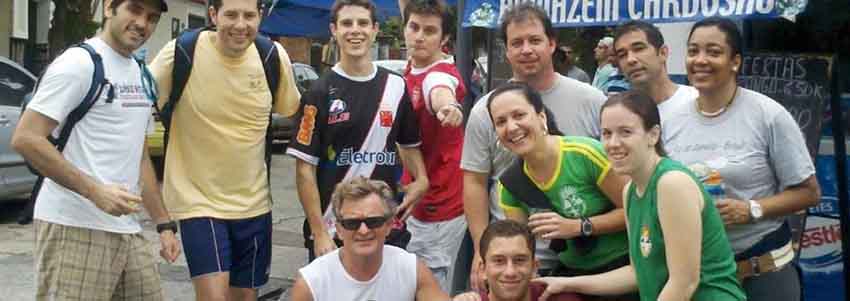Running buddies everywhere you go
RIO DE JANEIRO — Allan Stirling settles in with a pint at a crowded Irish pub of the sort that seem improbably to operate in every city on the planet, and greets — by name and with enthusiasm — many of his fellow patrons.
A Brit who married a Brazilian, Stirling is a member of the Rio Hash House Harriers, the local chapter of a global running fraternity. That’s how he’s come to know not only all of these people, including the many other expats who choose to spend an evening in an Irish pub in Rio de Janeiro’s Ipanema neighborhood, but also the city itself.
After running weekly with the group, "I know more about the geography of Rio than my wife does," Stirling said, raising his quickly emptying glass to yet another newly arrived running buddy.
International running clubs like this one offer travelers an insight to the places that they visit unavailable from guidebooks or escorted tours, not to mention a chance to shake off their jet lag with some physical activity and make instant, interesting friends among the locals.
“It’s life in the raw,” said Stirling. “You’re meeting people.” Besides, he said. “It’s a lonely thing to run by yourself.”
There are runners, and fast-increasing numbers of running clubs, in the remotest corners of the earth, with networks of new ones starting up or expanding for particular groups including everyone from black women to gays to mothers.
They’re easy to find online. Many local running stores have them. So do chains, such as Nike’s — including the Nike Store in Ipanema just down the Rua Visconde de Pirajá from this bar. The Road Runners Club of America and USA Track & Field each lists its affiliated groups in the United States, with links and contact information.
Hardcore runners will find like-minded competitors while on the road in ultramarathon, trail-running, and triathlon club. There are also niche groups such as Black Girls Run, a domestic network of running clubs for black women; Moms RUN This Town, with several hundred chapters in the United States and Canada; and the International Front Runners, a coalition of 100 clubs worldwide for lesbian, gay, bisexual, and transgendered runners.
Most are open, welcoming, and friendly to visitors — and none perhaps as welcoming and friendly as the Hash House Harriers, which originated in 1938 in Kuala Lumpur among British colonial officers and expatriates for the precise purpose of gathering for a run in an exotic foreign place, followed by socializing at a restaurant they called the Hash House. One of the rules is, simply: “Members are friendly to all.”
Today, there are nearly 2,000 chapters, including one at an Australian research station in Antarctica, all replete with odd traditions you’d expect from an activity invented near the twilight of the British colonial era.
Designated “hares” in every club map out ever-changing trails along routes usually marked in chalk. But the highlight is the post-run get-togethers, which feature beer and drinking songs such as “I Wonder What’s Under a Scotsman’s Kilt,” among others with less printable lyrics.
“It can be quite messy at times,” said Stirling, ordering another beer.
Once a year, the hashers run in red dresses to commemorate a traveler who once came right from the airport at a Hash House run in Long Beach, Calif. — and proceeded to run along in her red dress and heels.
Hash House Harriers chapters typically reflect their local cultures. Boston’s, for example, hosts pub crawls on the Friday and Saturday nights before the Boston Marathon, a hangover run on the day before, and a cheering section during the race itself, at which the members hand out beer instead of water.
Rio’s has a Carnival hash heavily populated by runners in town for the Brazilian version of Mardi Gras. Its weekly runs are often at night to avoid the heat and take advantage of stops at the occasional bar da esquina, or corner bar, every few kilometers. They often follow the promenades along the city’s astoundingly picturesque beaches.
An oil and gas industry consultant, Stirling has hashed all over the world in his travels, including in Azerbaijan and Dubai, where the club ran in a desert wadi outside of town at night with flashlights, drinking surreptitiously from the back of a four-by-four to avoid offending local religious restrictions on public consumption of alcohol.
He even has a hash name: “Stizzer.”
“You’ll be well-received,” Stirling said, ordering another pint and by now surrounded by several friends who have joined him at the table. “You just turn up and people welcome you.”
By Jon Marcus
Originally appeared on Globe.com December 23, 2016




